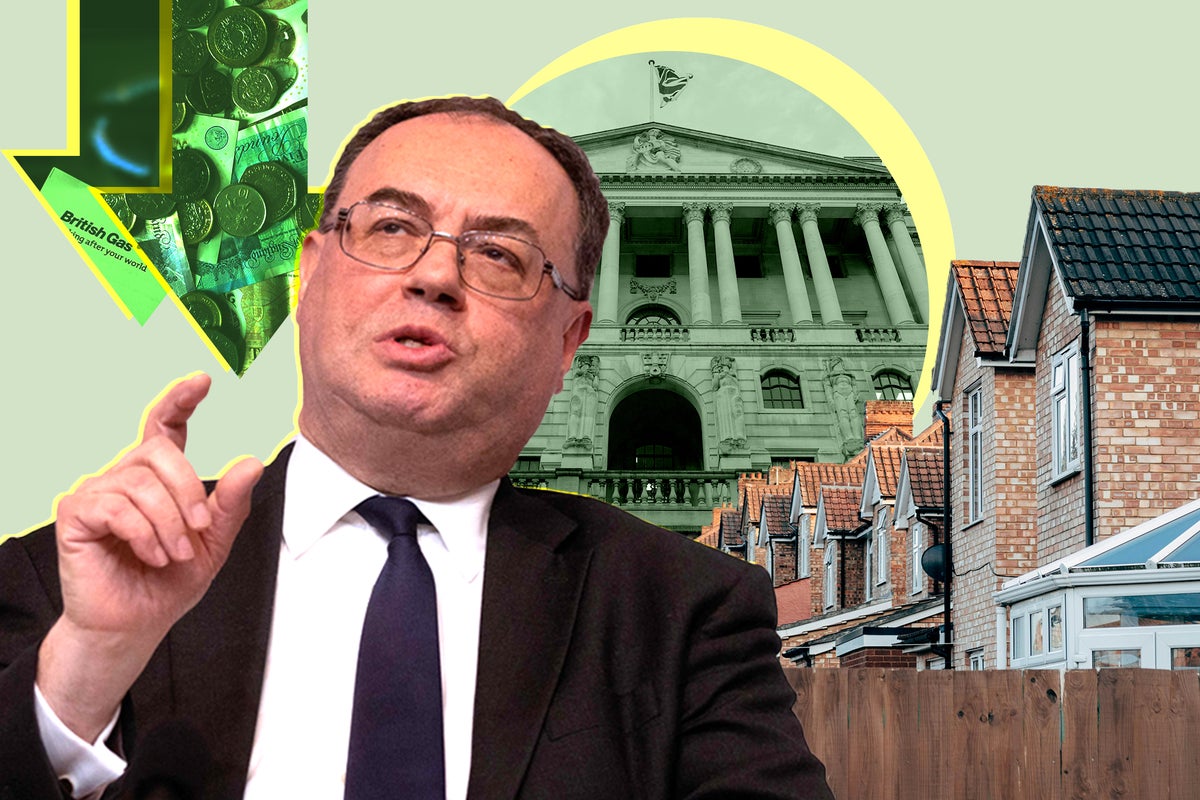Your support helps us to tell the story
From reproductive rights to climate change to Big Tech, The Independent is on the ground when the story is developing. Whether it’s investigating the financials of Elon Musk’s pro-Trump PAC or producing our latest documentary, ‘The A Word’, which shines a light on the American women fighting for reproductive rights, we know how important it is to parse out the facts from the messaging.
At such a critical moment in US history, we need reporters on the ground. Your donation allows us to keep sending journalists to speak to both sides of the story.
The Independent is trusted by Americans across the entire political spectrum. And unlike many other quality news outlets, we choose not to lock Americans out of our reporting and analysis with paywalls. We believe quality journalism should be available to everyone, paid for by those who can afford it.
Your support makes all the difference.
The Bank of England (BoE) has cut interest rates – a big boost for some homeowners, as it directly impacts their repayments on mortgages.
But not for everyone, not necessarily immediately and certainly not all the time in the same way. It also affects savers, borrowers and pretty much everyone else, of course, but mortgages are an exceptional cost.
For a full year now, the base rate has been at four per cent or higher; having been at one per cent or lower for over a decade, it meant the fast rise through 2022 to 2024 saw people paying far higher amounts on mortgages than they had been used to previously.
As it has finally started to fall from a high of 5.25 per cent, now down to 4.5, homeowner costs are starting to ease.
It’s still a different situation for everybody though, including those who are going through applications or renegotiations at the moment, so here’s a breakdown of how the rate cut may affect you.
Which mortgages could be affected first by a rate cut?
More than half a million people in the UK have a mortgage which tracks the BoE interest rate. Those should see an immediate change, whether the rate goes down or up – so their repayments will now reflect the rate falling to 4.5 per cent.
As for those on variable rates, they are likely to fall but aren’t guaranteed to, as it will depend on the lender and their plans.
Additionally, if you’ve got a fixed term deal from a higher rate which is expiring soon, this cut is an opportunity to renegotiate for your next rate.
“Anyone who chose a two-year fix will find rates still remain relatively high when they come to remortgage,” notes Victor Trokoudes, CEO of money app Plum.
“The latest average rate published by the Bank of England for a 75 per cent loan to value [mortgage] is 4.6 per cent, which is only slightly lower than the average rate two years ago. With the picture unclear as we head into 2025, homeowners will be looking to ensure stability by fixing at a rate they know they can sustainably afford, and it may be worth considering using a good broker to ensure they find a good deal.”
What happens if I’ve already got an application in or accepted?
If you’re already partway through an application and have had offers and deals presented to you, this might feel a slightly more confusing moment than if you’ve already got a mortgage and the amount you pay simply changes.
To get the best deal before you complete, make sure to speak to your mortgage broker and keep communication flowing, advises Alice Haine, personal finance analyst at Bestinvest by Evelyn Partners.
“Those applying for a new mortgage right now that have not signed on the dotted line are in a stronger position,” Haine told the Independent.
“This could improve their affordability position, increasing the chances of being able to secure a more preferable deal. This is where a mortgage broker becomes invaluable because they can scour the market for the most competitive products and compare rates and charges to evaluate the most cost-effective option for their particular situation.
“Borrowers midway through a new application or about to refinance with the same lender also have some wiggle room. Although they may have already agreed a rate, most lenders will allow customers to switch to a better deal with them before their new term starts provided they meet their eligibility criteria. It is best to speak to your lender directly to ensure you can qualify for a switch – and find out if they will charge you any additional fees for changing before your new terms begins.”
Switching to a new lender for better rates may incur charges such as exit fees, Haine explains, so check fully on both sides and make sure the numbers stack in your favour before agreeing anything either way.
Do all mortgages benefit from cuts?
The opposite to the above is if you’ve got a fixed term on a mortgage plan which isn’t due to expire soon – then you won’t see a change until that comes to an end.
Of course, whether that feels a positive or negative depends on what rate you have and when you locked it in.
Some still see further rate cuts ahead this year but it’s not a certain thing, even if it is the BoE’s eventual aim.
Brad Holland, director at wealth manager Nutmeg, says the “money markets are pricing in a further two to three rate cuts this year”, but notes that much could yet change to alter this plan.
Which mortgage lenders offer rate cuts first?
Looking around the market, it has already started to happen.
Andrew Montlake, director at mortgage broker Coreco, said: “Where Halifax goes other lenders tend to follow, so these cuts could trigger a chain reaction. The markets have baked in a rate cut on Thursday.”
Halifax cut rates 0.3 per cent ahead of the base rate announcement, while further rate cuts have also come from HSBC and Clydesdale Bank, with the former to announce the level of their cut today.
Holly Tomlinson, financial planner at Quilter, believes further deals may arrive soon but questions the value of waiting over seeing what’s available now. “Lenders have proactively reduced rates on various mortgage products in anticipation of the Bank of England’s decision. We may see some lenders introduce more competitive fixed-rate deals in the coming weeks but typically most new deals have already priced in today’s cut,” they said.

Haine, meanwhile, pointed out change can come slowly in some situations and don’t have to follow the rate.
“Some fixed mortgage rates have actually edged up in recent weeks which can be disheartening for borrowers about to refinance and hoping for a better deal. Another cut may improve that outlook but it can take a couple of weeks or so for lenders to respond to the change and reprice fixed-rate products,” they noted.
What impact will the cut have on the UK property market?
Often, we’ll see that lower potential mortgages move the needle on people buying property, but Garrington Property Finders CEO Jonathan Hopper warns there might be too many forces pushing in the opposite direction to have such an impact this time.
“The prospect of cheaper mortgages will give a decisive nudge to thousands of would-be buyers who kept their powder dry in 2024,” he said.
“In normal times a reduction in borrowing costs can prompt those planning a move to inch up their budget, and the result tends to be rising house prices. This time, not so much. While there is plenty of demand from buyers, the abundance of homes for sale is keeping price inflation in check.
“Some are happy to walk away from homes they like but feel are overpriced, due to choice in prime areas.
“The Bank’s decision has tipped the scales further in favour of buyers, but the inflationary consequences may be more muted than usual.”


